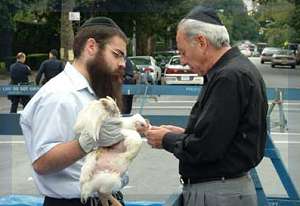Kaparot is an important tradition of the day of Erev Yom Kippur. On this day, in biblical times, the high priest would take a goat out to the desert, put his hands on it and confess all the intentional and unintentional sins of Israel. He would then let it go free into the desert and carry away all the sins. The purpose was to absolve Israel from ones negative acts and the resulting Heavenly decree.
Today, the Kaparot offering is still performed. Instead of a goat, one uses a chicken (a white rooster for a man, a white hen for a woman and a white rooster and two white hens for a pregnant woman), a fish or a bag filled with tzedakah. He or she swings the sacrifice above his or her head nine times, while saying the following three times:
The children of men: those who sit in darkness and in the shadow of death, imprisoned by suffering and (chains of) iron. He (G-d) brought them out from darkness and from the shadow of death, and He broke their chains. Afflicted because of their evil ways, tormented for their transgressions, their souls loathed food; they reached the gates of death. In their agony, they cried to G-d and He saved them from their grief. (Even now) He sends His word and heals them and rescues them from destruction. Let them praise G-d for His loving-kindness and His wondrous deeds to man. If there is an angel over him – one advocate from among a thousand – to bear witness to a man’s virtue, (then) He is gracious to him and says, “Save him from going down to the pit. I have found a ransom (to atone for him).”
Then one finishes the Kaparot, by stating: This is my substitute. This is my counterpart. This is my atonement. This rooster (fish or tzedakah) goes to (its) death, while I go to good long life and peace.
We now accept online donation by paypal or credit card.
With best wishes for a Happy, Healthy and Sweet Year!
